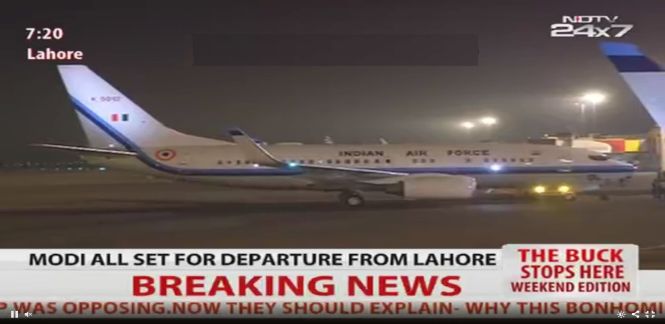
Prime Minister Modi Leaves Lahore (25-12-2015) after a historic meeting with Pakistan Prime Minister Nawaz Sharif
Prime Minister Narendra Modi addressed the Commanders of the three Defence Services recently. Dwelling on his foreign policy initiatives he mentioned his policy towards Pakistan thus: “We are engaging Pakistan to try and turn the course of history, bring an end to terrorism, build peaceful relations, advance co-operation and promote stability and prosperity in the region.”
While almost all Indian Prime Ministers have desired to move India-Pakistan relations into positive directions none has been so audacious as to proclaim a desire to “turn the course of history.” This high sentiment did not receive the analytical comment it deserved because the country was preoccupied with the slanging matches that occurred in the winter session of Parliament.
The real issue is whether Pakistan is ready for a historical change in the relationship for Modi cannot obviously bring about any change by himself. In this context the institution that matters is the Pakistan army. Prime Minister Nawaz Sharif may want to enhance the relationship but he, like any civilian leader, plays only a marginal role in the making of Pakistan’s India policy. The question that naturally follows is: are the Pakistani generals willing to give up their view that India is a permanent enemy?
There is no evidence in the public domain to indicate that the Pakistani army is changing its view on India. Its pursuit of low intensity war which is only a euphemism for terrorism is being calibrated but the infrastructure that sustains it is not being eroded. The generals are fighting the Pakistani Taliban but the Lashkar-e-Toiba continues to be supported as in the past.
The Joint Statement issued during External Affairs Minister Sushma Swaraj’s visit to Islamabad earlier this month contained Pakistan’s assurance to expedite the Mumbai trial. Such sentiments have been expressed in the past but to no effect. In any event even if some Lashkar operatives are successfully prosecuted that should not be taken as an indication that the army is eliminating terrorism from its security doctrine against India.
![]()

by Vivek Katju
Has Modi received assurances from Western leaders that Pakistan is willing to a partner in “changing the course of history”? If so, he will do well to heed the lessons of the past. M L Fotedar in his recently published political memoir ‘The Chinar Leaves’ recalls that in 1965 Prime Minister Shastri had received an assurance from the then British Prime Minister Harold Wilson that Pakistan will not attack Kashmir. Shastri relied on the assurance! Fifty years later we are not as credulous but once a leader is bitten by the history bug he is vulnerable.
Past experience informs that the generals attach great importance to the resolution of the Siachin issue. They want Indian troops to give up their positions on the Saltoro range and in turn Pakistani troops would withdraw from their posts too. This exercise would be to Pakistan’s advantage for India holds higher and advantageous ground in the Saltoro ridge.
Siachin was a subject in the Composite Dialogue established in 1998. Modi has agreed that the two countries will now begin a Comprehensive Bilateral Dialogue. This was announced during Sushma Swaraj’s visit to Islamabad. It would have been appropriate if the Siachin issue was taken out of the Dialogue. The reason is that there is a near consensus among security experts that the Indian army cannot afford to withdraw from the Saltoro range because of Chinese activities in Gilgit and Baltistan. Besides, if the Pakistani forces were to occupy the posts vacated by India then only a full scale war would make them leave them.
Is it that the wish to make history perhaps during Modi’s visit to Pakistan in 2016 for the Saarc summit made Indian diplomats enter into the Dialogue format without seeking the removal of the Siachin issue. A clarification needs to be given by the government.
The Comprehensive Bilateral Dialogue will have three broad themes—cooperative mechanisms such as enhancing trade, issues resolution including Jammu and Kashmir and humanitarian matters such as release of prisoners. Pakistan has always asserted that bilateral relations cannot be normalised unless all outstanding issues especially J&K is resolved. India has focussed on improving cooperation for that would create a conducive climate to address outstanding matters.
Will the generals now allow the extension of the Most Favoured Nation treatment to India in trade, by whatever name? That will indicate that they are willing to relax their hold on trade. As yet there has been no indication that they want to move in this direction even though Nawaz Sharif is eager to do so.
The weight of experience in dealing with Pakistan instructs caution and patience, not a forceful move to change history. That is a path of compromises and an inch by inch retreat. Modi has doubtless retreated from the Ufa Joint Statement. How much more will he go down that road in his quest to “try and turn the course of history”?